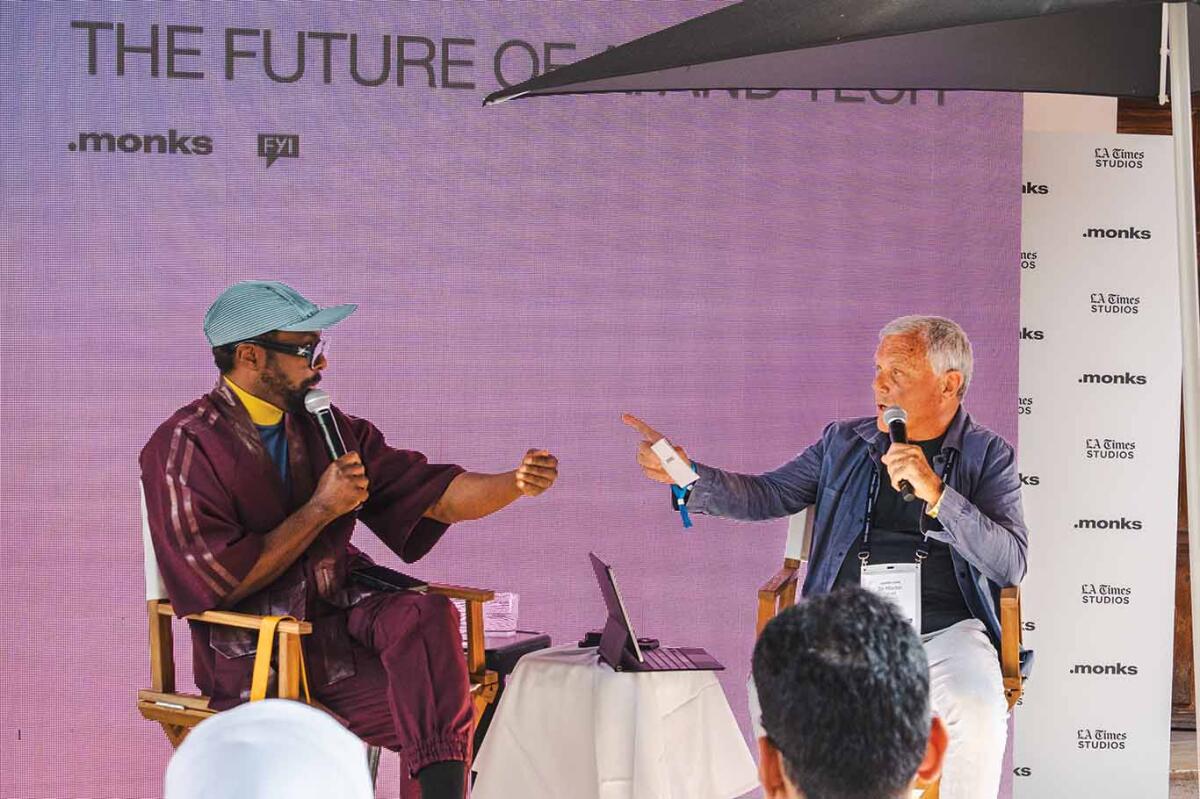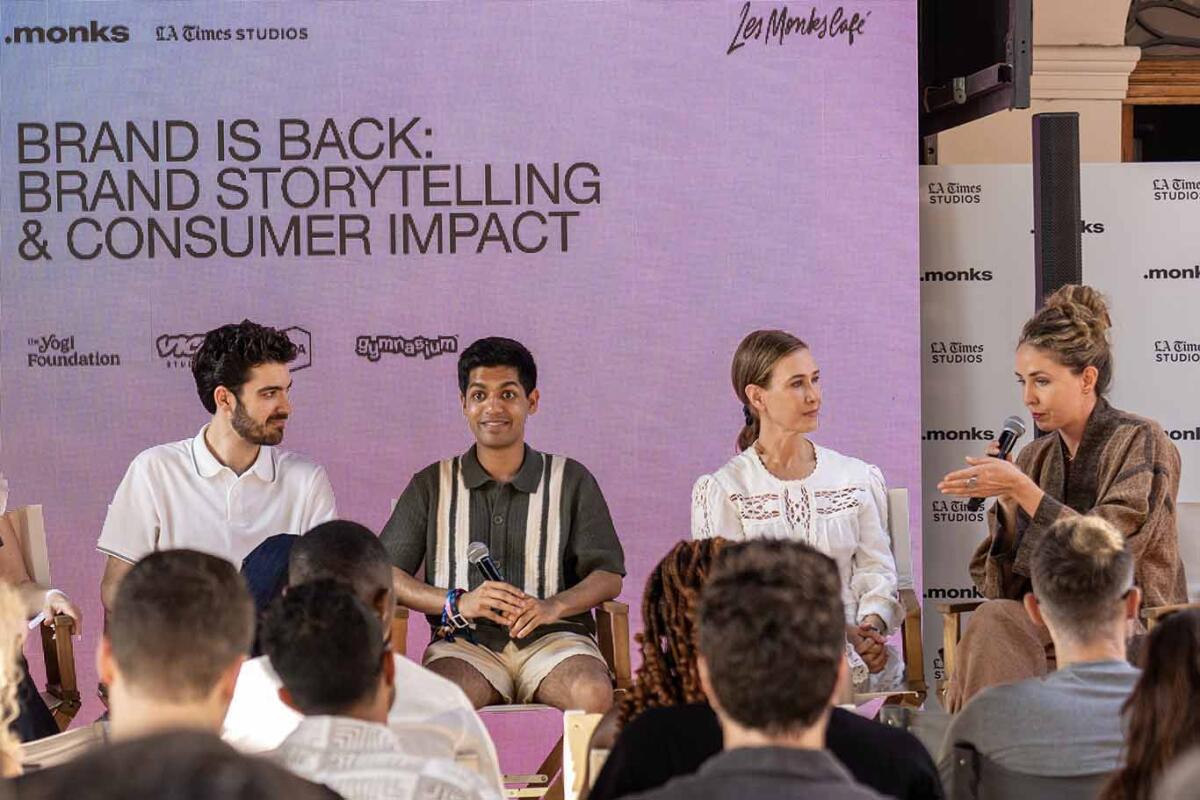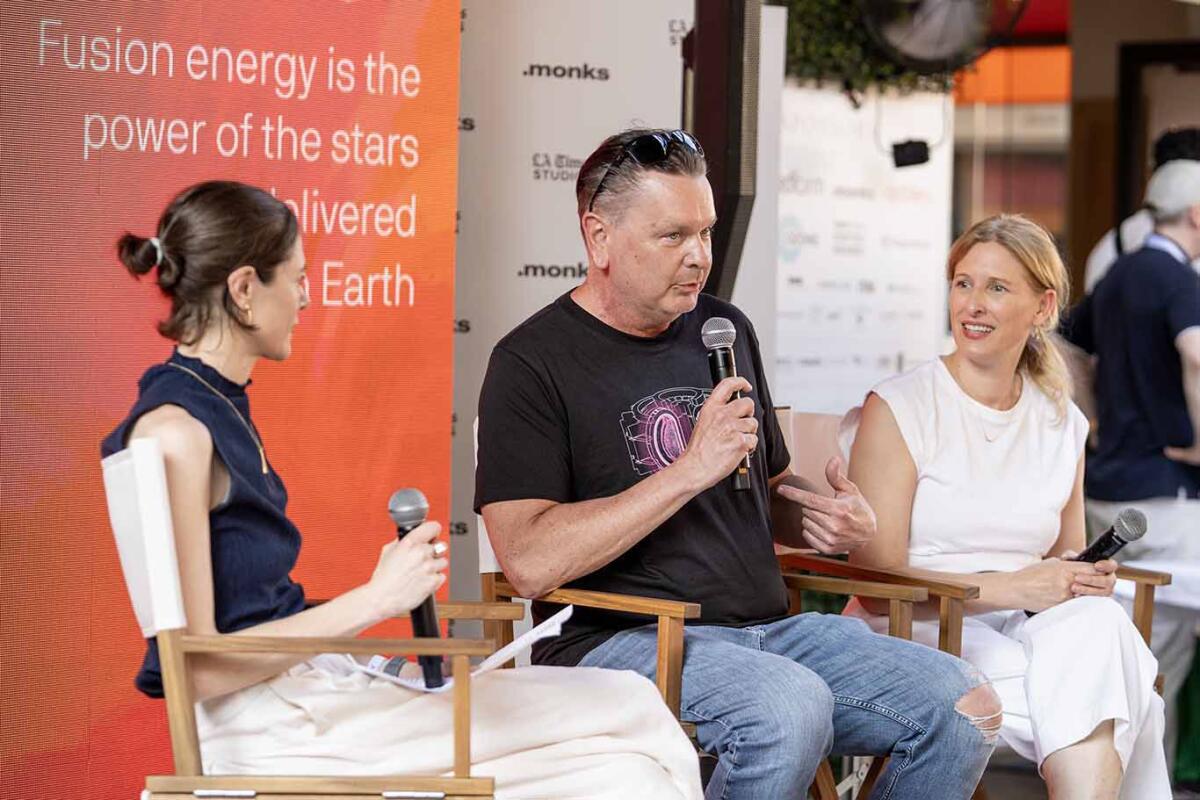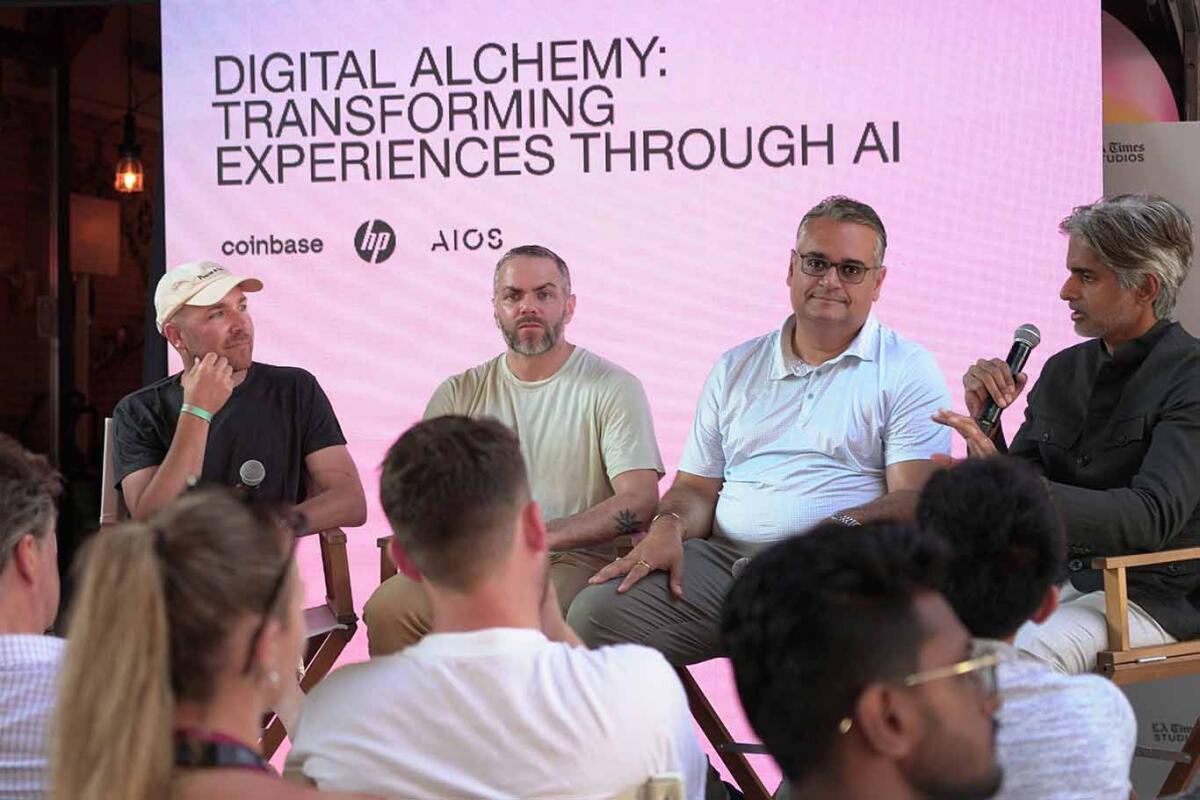AI Transforms Brand Storytelling at Cannes Lions

- Share via
LA Times Studios and .monks collaborated at the Cannes Lions festival to host a series of discussions on the transformative impact of AI on brands in a rapidly evolving economy. Held from June 16-20 at Les Monks Cafe, these sessions explored how AI-driven orchestration influences efficiency, transparency, and awareness throughout the brand journey, from ideation to delivery.

Brand Is Back: Brand Storytelling & Consumer Impact
One key panel, “Brand is Back: Brand Storytelling & Consumer Impact,” brought together industry leaders to discuss the power of brands in shaping culture and influencing consumers. Anna Magzanyan, president of LA Times Studios, opened the discussion by emphasizing the importance of impactful storytelling.
Lauren Wood, president of The Yogi Foundation, highlighted the link between storytelling and community development, stating, “We must bridge storytelling and regeneration to create real change.” Amy Powell, president of VICE Studios, addressed the challenges brands face in resonating with skeptical audiences. Ziad Ahmed, head of Next Gen at UTA, underscored the power of personal narratives in branding, while Adam Faze, co-founder of Gymnasium, discussed adapting storytelling for the digital landscape. The session concluded with an exploration of how authentic brand stories can build deeper consumer connections and drive meaningful impact.

Fusion Is the New F Word: Hot AF – Fireside Chat with Commonwealth Fusion Systems
In a fireside chat titled “Fusion Is the New F Word,” Kristen Berke, VP of entertainment and branded content partnerships at LA Times Studios, moderated a discussion with Joe Paluska, CMO, and Jennine Willett, creative director, from Commonwealth Fusion Systems (CFS). They explored the transformative potential of fusion energy and how to make this complex topic accessible.
Paluska humorously set the stage, stating, “Fusion is the new F word...it’s hot AF,” before tracing fusion research back to Sir Arthur Eddington’s 1920 theory that the sun’s energy comes from fusion. Willett clarified fusion as “the power of the sun and the stars,” emphasizing its clean, limitless, and safe nature. She explained how it “creates a star and holds it inside” through plasma at extreme temperatures. The panel discussed the historical challenges of scaling fusion and the recent $9 billion investment in research. Paluska and Willett shared their vision for using innovative marketing to demystify fusion energy, aiming to spark public curiosity and drive change in clean energy. The conversation highlighted the urgent need to communicate fusion’s benefits for broader public understanding.
The Future of Creativity & AI: A Fireside with Sir Martin Sorrell & will.i.am
“The Future of Creativity & AI” panel featured a compelling conversation between Sir Martin Sorrell, executive chairman of S4 Capital, and will.i.am, founder and CEO of FYI.AI. This fireside chat explored how artificial intelligence can transform the creative landscape, highlighting how brands and leaders can engage audiences and influence cultural narratives. The discussion emphasized the intersection of technology and imagination, showcasing how innovators can redefine collaboration and inspire change. Attendees learned about the democratization of knowledge, the evolution of creative processes, and how AI can enhance rather than replace human creativity.
will.i.am shared personal reflections on his upbringing, acknowledging his grandmother’s legacy and his mother’s sacrifices as a single parent. He expressed concern for his brother’s education, noting, “Everything you just learned in school probably won’t apply moving forward, but you still have the fundamentals.” He highlighted the evolving role of women in society, stressing their leadership in empathy and compassion, which are urgently needed in AI. Describing himself as “ambitious, audacious, curious, and hyper imaginative,” will.i.am showcased his commitment to creativity and innovation. The session offered a thought-provoking perspective on the intersection of technology and creativity, underscoring the essential role of empathy and community in shaping a positive future.
Knowledge Is Power: The Real ROI of Media Transparency in the Era of AI
In “Knowledge Is Power: The Real ROI of Media Transparency in the Era of AI,” panelists discussed the evolving landscape of media transparency and the necessity for real-time performance visibility in marketing. Moderated by Linda Cronin, EVP and global head of media at Monks, the panel included Meredith Zhang, measurement partner at TikTok; Millie Chu, senior director of media analytics at T-Mobile; and Jay Pattisall, VP and principal analyst at Forrester. They explored how CMOs need “Bloomberg Terminal”-like tools for continuous insights into brand content, stressing that a lack of visibility could hinder success by 2025.
Zhang emphasized that “radical visibility” is essential for effective decision-making, comparing the need for media insights to financial decision-making tools. She noted challenges in measuring effectiveness, explaining that traditional metrics often fail to capture the nonlinear consumer journey, especially on platforms like TikTok. Chu supported this, stating that real-time media performance information is currently “more idealistic than realistic.” She stressed that achieving effective transparency requires substantial investment in infrastructure and a commitment to data-driven insights. Pattisall advocated for a “360 view” of media performance, desiring “more real-time MM” and “full loop attribution” to assess how all marketing elements work together.
The panel collectively underscored the growing importance of media transparency and the need for sophisticated measurement strategies in a rapidly evolving digital marketplace, concluding that without real-time insights, brands risk falling behind.
Future-Proof or Fall Behind: The AI Investments That Build Resilient Brands
This panel at Cannes explored how companies leverage AI for growth and efficiency, focusing on smart technology investments for business resilience. Lewis Smithingham, SVP of strategic industries at Monks, moderated the discussion with Bobby Mohr, VP of revenue at Twelve Labs; Matt Carter, head of industry at AWS; Jamie Allan, director of adtech & digital marketing industries at NVIDIA; and Christian Fraser, broadcaster and writer at the BBC.
The panel addressed AI integration challenges and opportunities. Carter highlighted that “around 80% of AI projects that fail do so not because of model performance, but because of the data foundations that they are built on.” He stressed the importance of centralizing and organizing accessible data, stating, “You need to make that data accessible and interoperable,” to combine diverse data types effectively for AI initiatives.
Mohr discussed Twelve Labs’ video AI capabilities, emphasizing the need for brands to adopt cutting-edge technologies to streamline processes and enhance viewer experiences, warning that failure to do so risks falling behind. Allan noted that while data is abundant, its strategic organization is crucial, aligning with Carter’s points on data readiness. Fraser highlighted the necessity for media companies to engage audiences personally, emphasizing AI’s role in understanding preferences and tailoring content.
The discussion also touched on misconceptions about data value, with panelists agreeing that not all data holds equal weight and focusing on high-ROI data is essential for effective AI strategies.
Playing in Perfect Sync: Orchestrating AI and Creative Intelligence
The “Playing in Perfect Sync: Orchestrating AI and Creative Intelligence” panel featured experts from Monks, NVIDIA, and AWS, focusing on the critical role of creative intelligence in marketing. Moderated by Bruce Biegel, senior managing partner at Winterberry Group, the discussion included Dave Carey, global EVP studio & embedded solutions at Monks; Matt Groshong, business development director for AdTech & MarTech at NVIDIA; Victoria Milo, SVP of media solutions & emerging technology at Monks; and Jon Williams, global head of agency partner development at AWS.
The speakers highlighted how AI innovation and strategic partnerships enhance marketing operations and streamline the content supply chain, especially as marketers demand high-quality content delivered quickly. Carey noted that economic pressures for reduced spending and cost efficiency are driving the need for creative intelligence, pushing companies to adapt quickly to AI and automation. Groshong emphasized the rapid pace of technological advancement, stating, “The speed at which technology is advancing today means that what you couldn’t do last week even is now possible to do at a level that really surpasses what you were able to do even a month, two months ago,” underscoring the urgency of embracing change.
Milo shared insights on collaborative team efforts and leveraging platforms like Meta, Google, and TikTok, which are pushing for more creative innovation to complement their algorithms. She stated that the demand for smarter, purpose-driven creative is an increasing requirement, fostering discussions about maximizing data and investing wisely in creative assets.
Williams underscored the significance of personalization in driving business growth, asserting, “The leaders in are growing at 10 points a year faster than laggards.” He explained that aligning the value of creative assets with audience interactions presents a profound opportunity for businesses to enhance their performance and outcomes.
The panel emphasized the urgent need for enterprises to adopt more sophisticated, AI-driven creative strategies. By integrating technology and creativity, brands can enhance customer experiences and maintain brand integrity. The discussion highlighted that as technology evolves, creative work must adapt, focusing on collaboration and innovation.
Where Creativity Meets Automation: AI and the Future of Marketing Workflows
This panel focused on the evolving relationship between creativity and AI-driven automation in marketing workflows and how these innovations are transforming content production and reshaping team dynamics.
Tanya Bogin, EVP and global head of studio at Monks, moderated the session, which included insights from Pat Murphy, founder and CEO at MurphyCobb; Hannah Elsakr, Intrapreneur for GenAI at Adobe; Olga Mykhaylenko, SVP of operations at Monks; and Christine Maguire, global VP at Tripadvisor.
Mykhaylenko discussed the shift from individual creativity to collaborative team efforts, stating, “First of all, creative ego is shifting from individuals to teams. Production is no longer the end of the line, but actually a part of the creative engine.” She emphasized that the creative process now resembles software development, requiring consultative discovery, rapid prototyping, and iterative testing.
Elsakr highlighted the benefits of automation in reducing mundane tasks, stating, “I think it removes the drudgery from creative work...we cut that process in half.” Her comments underscored how AI enables teams to work more efficiently, freeing them to focus on strategic initiatives.
Murphy noted how traditional roles within the creative process are transforming due to the need for immediate feedback and iteration. He pointed out that creative directors and collaborators must now wait for final results before assessing work, changing their role.
Maguire echoed these sentiments, discussing how changing workflows require marketers to adapt and collaborate in new ways, increasing demand for agility and responsiveness. The discussion revealed a significant evolution in marketing, where AI enhances creativity, and teams are empowered to innovate and collaborate more effectively.

Timeless, Not Static: Evolving Brand Identity with Purpose
In “Timeless, Not Static: Evolving Brand Identity with Purpose,” moderated by Anna Magzanyan, president of LA Times Studios, industry leaders discussed how organizations can maintain their core identity while adapting to market changes. Speakers included Brendan Ripp, CEO of Pushly; Meridith Rojas, CMO of VidaCorp North America; and Robert Nathan Fried, CEO of Niagen Bioscience.
Magzanyan opened, emphasizing that “The most resilient brands aren’t reinventing themselves every few years. They’re actually evolving with clarity, tension, and purpose.”
Ripp, with his digital publishing background, stated, “Authenticity is a practice. It’s not a tagline,” and noted how AI has changed audience expectations, remarking that Google is now “an answer engine.” Rojas discussed launching MCO Beauty in the U.S., focusing on community. She emphasized the need for brands to be “a very diligent listener” to consumer feedback. Fried offered a unique perspective on blending science and storytelling in brand identity, reinforcing that stories must resonate authentically to foster connection and trust.
Their diverse experiences illustrated that by remaining attuned to audiences and values, brands can effectively navigate a dynamic marketplace.

Digital Alchemy: Transforming Experiences Through AI
The “Digital Alchemy: Transforming Experiences Through AI” panel, moderated by Anna Magzanyan, president of LA Times Studios, explored how leading companies use AI as a catalyst for cultural transformation. Industry leaders shared insights on AI’s role in reshaping strategy, creativity, data, and growth in modern brand-building.
Ganesha Rasiah, chief strategy officer at HP, highlighted AI’s ability to enhance speed and decision-making through internal and external analysis, significantly saving time and bolstering strategic efforts. Patrick Marzullo, senior director of creative studio at Coinbase, discussed AI’s vital integration with creativity, emphasizing its role in reshaping creative challenges and fostering collaborative innovation.
Michael Cohen, chief data & analytics officer at Plus Company, echoed similar themes, noting AI’s transformation of marketing through explainable, actionable insights and its importance in shaping effective strategies through a predictive intelligence platform. Karan Chetal, chief growth officer, technology services at Monks, contributed a relevant perspective on how AI-driven insights can enhance client engagement and empower sales teams, emphasizing AI’s role in personalizing interactions at scale for measurable business growth.
The panelists conveyed that thriving companies embrace innovation as part of their culture. They illustrated that AI augments – not replaces – human creativity and strategic thinking, providing valuable insights into navigating the evolving technological landscape while remaining grounded in core values.
These nine discussions at Cannes Lions reinforced the critical importance of authenticity and innovative storytelling in an evolving landscape. Across panels, industry leaders emphasized that brands must forge genuine connections with consumers through impactful narratives while embracing new technologies to engage and inspire. By prioritizing transparency and collaboration, brands can navigate challenges and drive meaningful change, ultimately shaping cultural narratives and fostering deeper relationships with their audiences.






